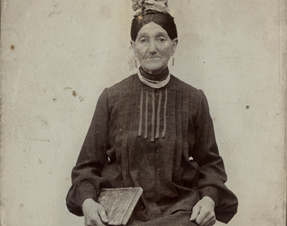
Photograph of an unknown woman, late 19th /
early 20th century [City Archives: MS 2526/A/2/6]
|

Photograph of two men, late 19th / early 20th century [City Archives: MS 2526/A/2/1]

The Back to Backs
on Inge St, 2006
|
Hurst Street
Hurst St was well-known as a Jewish street in the 19th and 20th
centuries and there have been many Jewish buildings here at various times
including two synagogues, a mikveh (ritual immersion pool), a school, and many
shops and private homes.
A glance at Kelly's directory (the 19th century equivalent of today's Yellow Pages) reveals several possible Jewish names and occupations in the buildings on Hurst St in 1890:
East side |
4 |
Joseph King, watchmaker |
8 |
Confidential Loan and Advance Company (Samuel Edward Marks, manager) |
13 |
Hyman Lyons, pawnbroker |
30 |
Jacob Moore, bird dealer |
35 1/2 |
Jacob Harris, slipper maker |
47 |
Fanny Raphael, second hand clothes dealer |
| |
West side |
62 |
Marcus Myers, glazier |
63 1/2 |
Henry Samuel Ansell, watch case maker |
64 |
Joseph Hyman Carter, basket maker |
73 |
Solomon Harris, second hand clothes dealer |
81 |
Lawrence Hyman Davis, tobacconist |
89 |
Isaac Greenberg, tailor |
The first Hebrew School building was in Lower Hurst St. It was set up by a group of prominent local Jews, who thought that 'it was a pity that a school was not in existence for the Hebrew children, who seemed to be wandering about entirely at the mercy of circumstances, without any means of having their ideas properly formed'.
When the school opened in 1843, there was an elaborate opening ceremony, which was attended by many important people in the town and was followed by a celebration dinner. The school moved to a building next to the new Singers Hill synagogue in 1856.
A Jewish family lived in one of the Back to Back houses on Inge St, now owned by the National Trust. Their house has been furnished to show how it might have looked on a Sabbath evening in the 1850s.
|

Directions
Continue walking down Blucher St. Turn left down Gough St, then right along Suffolk St Queensway. Cross over the pedestrian crossing on the roundabout and turn into Smallbrook Queensway. There is a set of traffic lights and a pedestrian crossing on your right, in front of the Radisson Hotel. Use this pedestrian crossing, then turn right, passing Scala House (don't go into the subway). Take the first left onto Thorp St and turn right onto Hurst St. Stop in front of the Hippodrome Theatre.
|